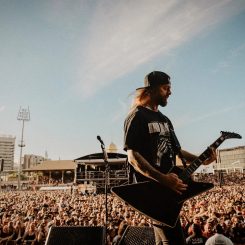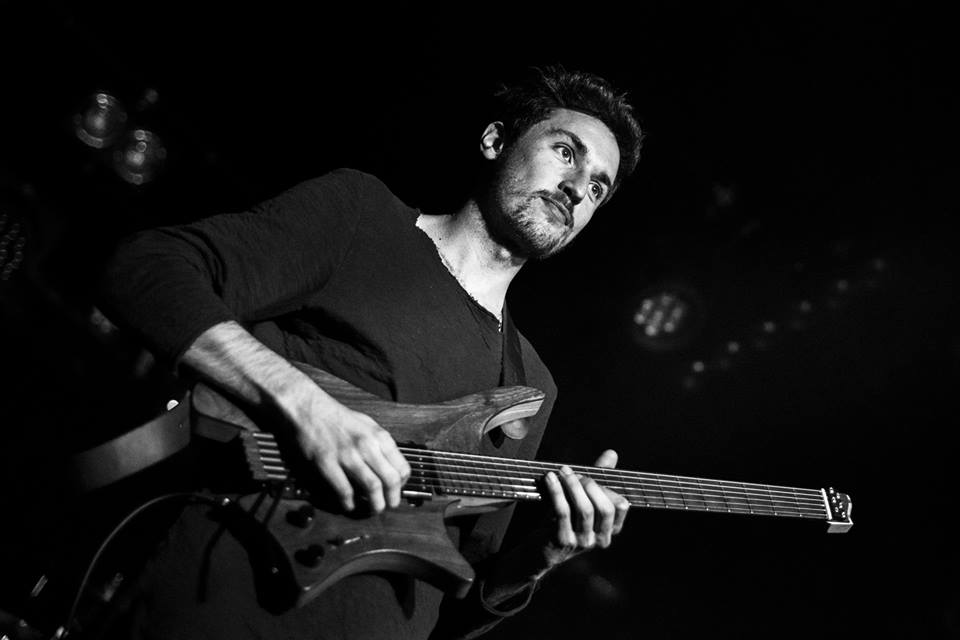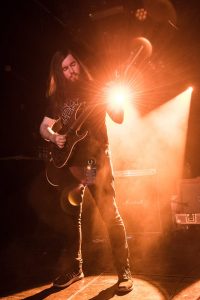
2017. április 28.

Sydney-based guitarist Plini Roessler-Holgate – simply known as Plini for most of us – has built quite a name for himself in just a couple years as he broke into the prog scene from his bedroom studio. Following a trilogy of EPs, several charity projects and countless collaborations, he finally released his debut album, Handmade Cities last August. Having toured all over Europe, North America and his home continent, he once again hit the roads of Europe in March, this time as a headliner, with support coming from David Maxim Micic and Disperse. It was at that tour’s Budapest stop on the boat venue A38 where I caught up with him over a beer to talk about his career, progressive music, philanthropy and Steve Vai mowing his lawn.
It’s your second European tour within a couple of months, between which you had a North American tour… you’ve been really busy, man! Why did you decide to do this trek again?
I guess the earlier European tour with Animals [as Leaders] came as a surprise pretty much. I had almost finished writing and recording the Handmade Cities album, thinking that I would have all of July and August to just mix it and mess around and make it cooler than it would have been, and then that happened. So I was like “oh shit, I guess I’m finished!” And it was good because I didn’t end up really needing to rush anything, it all still had plenty of time, but I guess that took 2 months out of time that I thought I’d be at home. I got home from that tour a week before the album came out, and I guess because I do everything myself that it became bit of a scramble, not in terms of rushing any of the content, just being there to press the ‘on sale’ button and stuff like that. So then I did an Australian tour for [the album], and then Animals invited me to America with them, so I guess that American tour was supporting the album. I got such a great response from all the audiences in Europe that talking to my booking agent it was kind of like “what do we want to do next?” After playing with Animals it doesn’t really get better in prog. I guess Devin Townsend is kind of my next goal as someone to support as he plays beautiful theaters and stuff. So I guess this tour should have been called the “Hey Devin Townsend, take me on tour! Tour”. Well maybe not specifically Devin Townsend, but the idea was based on thinking that by doing a headlining tour it would confirm that there are enough people who care about this music in a kind of business-y way, and that’s something a booking agent could use to get me to play with Devin Townsend, or Tesseract, or bands like that.
After saying that you can’t get in a much better position than touring with Animals as Leaders, did you have any apprehensions when getting into this particular tour with David? Having come here with a huge band before, did you ever ask yourself whether this is going to work without Animals as Leaders?
I guess it was based on a feeling, but so far I’ve had such a great time almost every show I’ve played, that I feel like I am fairly in tune with the kind of audience I can expect, and I’ve definitely been more surprised than anything how good this tour’s been so far. I think tonight probably won’t sell out, but it’s probably the biggest show of the tour. I mean aside from this, most of the rooms we’re playing aren’t the same as with Animals of course, because they’ve been doing it for a lot longer. But I feel like there’s definitely enough interest to pack out a small club around Europe now, which is crazy. Doing this with David [Maxim Micic] and Disperse is something a lot of people are going to enjoy, because we’re all kind of doing similar things, and obviously I love those guys as friends. So to me it’s like worst case, I go to Europe, lose lots of money, no one comes to a single show but I spend a month in Europe with a bunch of guys I really like, so it’s kind of like an expensive holiday.
A lot of forums and a lot of talk in the past couple of years said that a Plini and David Maxim Micic tour was inevitable. Did the result live up to expectations?
I guess with that it’s kind of the same way that I know where I have an audience. I think it’s not necessarily that I heard from people saying that “oh you and David need to do something together!”, I think that’s something that we both just felt ourselves. So I guess it’s like a mutual feeling between us and the audience that would kind of make sense. It especially makes sense in this case because he doesn’t need to fly from Australia, he’s poached band members from Disperse and my band to make his band, so it’s sort of a compact family. But I guess we all play music that ends in a kind of weird show for anyone who likes guitar music.
 It’s really similar to what you did last time with the Plintervals setup, that you got musicians hopping into one band and then performing a set later on with another. Is this due to financial reasons, or logistical, or…?
It’s really similar to what you did last time with the Plintervals setup, that you got musicians hopping into one band and then performing a set later on with another. Is this due to financial reasons, or logistical, or…?
It’s kind of all of it. I mean obviously we have less mouths to feed, it’s cheaper, especially with flying from other places. I guess the other thing is that even though Intervals is a band name, it’s just Aaron [Marshall’s] baby, and we’re all in a similar position where we get to be control freaks with creating the music, but presenting it live it’s kind of open to a ‘spin’. So for that tour it made sense logistically, but it was also really fun to have a guy that has his own personality on guitar playing the rhythm parts and playing solos. It’s the same for this, I get to bring my dude Jake [Howsam Lowe] who I’ve toured with overseas for about a year now, so now the European audience gets to see a big bearded Australian guy play. Even though it’s some of the same songs, it’s a different experience because the dynamic changes. I think that’s a really cool opportunity, which is a bit rare, because with most bands you want to see the band members.
Does this ever push the guest musicians to the background? How much of a one-man-show is the Plini experience?
I think you’ll see tonight that it’s almost more about the band than me, which I kind of like, since it’s kind of the best thing for me to be the worst musician in my band, because I can just see what they’re doing and enjoy it. I’ll intentionally fill shows with plenty of drum solos, bass solos, other guitar solos in the set, because I think the recorded music is something that I put all my time into and kind of controlled every little thing. I don’t think that presenting it like that live would necessarily be very exciting, and that’s something that I’ve not enjoyed in a lot of performances where it’s all about a certain member. I think one of the most exciting things at any live show is when a band member that you don’t expect gets the limelight for a minute. If you go to an Opeth show, one of the things that a crowd reacts to most intensely is when he introduces the band and they all take a little solo. I guess that’s the vibe that I want to create at these shows.
But you’re being overly modest when saying you surround yourself with musicians who are better than you, since recently one very particular, very famous musician had a lot of nice things to say about you, namely Steve Vai. As a young guitarist, what did that feel like?
It still hasn’t really sunk in, because he’s like a childhood hero. You grow up buying DVD’s with this dude’s face on it and watching interviews. So it’s kind of crazy to be in this situation with someone like that, but I guess if anything it’s just really inspiring for me to know that whatever I’m doing, which is essentially just doing things that make me happy, has attracted someone else who’s gone through so much stuff, and supports me. It hasn’t really hit me that he’s a guy I’ve talked to a few times in person and he likes my music. The thing it has triggered in me is kind of to stick to what I’m doing and just going on a weird journey figuring out what I want to do with music and guitar playing.
You said you talked to him in person, was that recently, after he made these comments?
Before and after I think. The first time I met him was in January 2016 around NAMM, the instrument convention. At that point I think he’d heard some clips of my music, we had a mutual friend, and I think it was him being like “this guy’s nice, I will grant him a few minutes of my time”, because I’m sure he knows how inspiring that’s going to be. He’s a one hundred percent genuine, friendly guy. I guess since then he must have heard the album more in his own time, and decided there was stuff in there that he likes.
Is there anything in the making between you and him, any musical venture?
The most recent time I met him, as I was leaving, he said “if there’s anything you ever want or need, just let me know”…
Coming from Steve Vai… wow!
Yeah I mean obviously he’s not going to mow my lawn…
If that’s what you would ask from him, well hey…
He probably would do it and just laugh! But I said “take me on tour!”…which remains to be seen. I guess with a guy like that there’s so much behind-the-scenes management stuff, booking agent stuff, in a scale that’s way bigger than where I’m at. It’s not as easy as him just saying “alright, we’ll take this Australian guy on tour”.
In a recent interview in regards to Handmade Cities you said the following: “I think I’m getting slowly closer to figuring out my own voice and composition in guitar playing”. Would it make sense to say that this is the reason why you caught the attention of the musical genius that is Steve Vai?
I guess so, yeah. He can play anything, and he will have heard guitarists that can play anything, and that’s definitely not something that I am good at. Technically I’m not really anywhere near the same level as a lot of people my age, who can do just crazy shit on guitar. But I guess because I spent so much time composing and trying to figure out what I can do with music not just on a guitar, that’s kind of interesting or different, and I guess personal to me. I guess he can recognize that sort of pursuit.
 It would be really good to find a moral of this story, that by finding your own voice, you caught the attention of one of the ultimate guitar gods, and not just by going into a store and blowing $30,000 on high-end equipment, putting together the most incredible sound quality, but by using your hands and a relatively simple setup. Would you say that’s your philosophy in recording music?
It would be really good to find a moral of this story, that by finding your own voice, you caught the attention of one of the ultimate guitar gods, and not just by going into a store and blowing $30,000 on high-end equipment, putting together the most incredible sound quality, but by using your hands and a relatively simple setup. Would you say that’s your philosophy in recording music?
Definitely, because music is so subjective. Obviously there are tones that we like more and tones that we like less, but I don’t really view guitar playing or recording as something that has an objectively good or ‘best’ outcome. So with a guitar tone I don’t think I need to get this pedal and that new guitar cable, like that’s going to make my tone the best. But if I just work with whatever I have… it’s like if you put a child in a playpen with a bunch of random objects, they’ll just put them together in some way that feels exciting and interesting, and it’s not necessarily the quality of a toy car that makes it an interesting, creative expression. I guess that’s my goal with music.
Would you say that the simplicity of your setup enhances your expression rather than constraining it?
Yes and no. There are certain ideas where I’d love to just get weirder and weirder, and it would be cool to just have a 200 person choir. But not getting caught up on the quality or the quantity of the stuff you have at your disposal is valuable.
Definitely. Before we talk about Handmade Cities, I wanted to ask you about your earlier philanthropic venture with Ko Ki and Every Piece Matters. How did you initially get familiar with Raw Impact?
I studied architecture at university, and one of the classes that I did was in partnership with Raw Impact. That class was designing a community shelter for a poor village in Cambodia, and there was an option at the end of it, that for the winning design anyone in the class could travel to Cambodia to help build it. I guess I’ve become someone who likes to say ‘yes’ to any possible opportunity. So I did that, and had an amazing time. It was kind of like a life-changing experience. So then I got a mailing list email from them about the Every Piece Matters project, which was to repurchase land that was going to be bought out by the government, and would push people hours away from their families. I can’t remember why, I guess I was busy probably going to NAMM to be a nerd and play guitar, but I couldn’t actually take part in the project. I thought I might as well just write a song to fundraise for it. Doing interesting things with music, I see that as the most valuable thing I can do with it. Like coming to sit on a boat, drinking beer with people that I vaguely know is to me a really fun outcome of me having been in my bedroom playing guitar. So in the same way, being able to see a family across the world live in a house that was built partially because of some money that I contributed is a cool outcome of me working on vibrato.
It adds a really cool dimension to making music. Most young musicians think of it like: you write a song, you record it, publish it, tour with it, do this across albums and albums, and you tour the world, and that’s the end-all and be-all of musicianship. These experiences like playing on a boat, doing philanthropy; is it important to you to have these extra dimensions to your music career?
Totally. I think being in a modern progressive metal band can easily boil down to: you’re in a band, you’re really sick at your instrument, you write sick songs, and then that becomes an album, which a record label releases, you tour your home country, then you tour the rest of the world, then maybe you tour your home country again, release a music video after 2 months or something, then just go home exhausted, wait a while, then do it again. I feel like that’s kind of what being a modern prog metal band is. Whereas I guess I’m trying to push myself into situations where it’s kind of the opposite.
 That sounds much more “progressive”, in the lexical sense of the term, than a lot of bands just repeating the same old shit musically, and saying “we’re progressive”. I think the word “progressive” in metal, or music in general, has been beaten to death in this sense.
That sounds much more “progressive”, in the lexical sense of the term, than a lot of bands just repeating the same old shit musically, and saying “we’re progressive”. I think the word “progressive” in metal, or music in general, has been beaten to death in this sense.
It’s become more a term for describing a certain sound than a value or a principle. Which I guess can be on either side of the table. Like the word ‘djent’, either it is or it isn’t a genre. To me it’s a term that means something, and it’s a quick way to get across an explanation of a sound, or a band or something like that. But I guess because I write music for my own enjoyment, and I’m trying to make a life for myself that’s just fun and strange, I kind of do whatever I can to not make it become just that album-tour cycle.
It’s interesting that you mentioned Devin Townsend in particular, since I think he does a lot of really similar things, like he’s been saying he wants to do this entire musical and step up his whole routine of just doing an album and touring it.
I think that’s totally a guy who is obviously a complete genius, but he’s also found a lot of his success through that album-tour process, since he came into the music scene when that was the way to do it. It’s really inspiring to see him branching out in this stage of his career, doing things that are obviously not the best way for him to buy a new car, but definitely the best way to do something crazy exciting, which inspire people like me to want to push for weirder and weirder creative things.
It’s funny how, in some respects, you’re on opposite ends of the spectrum. You’re young, and you’re looking for this dimension to your music, and you’re going to do the Steve Vai thing, and he already did the Steve Vai thing, but he’s older and he’s looking for the kind of things that you’ve been doing as well.
Yeah, but I guess he has more means to do these kind of things with an orchestra and a choir and stuff, but I’ll get there.
It seems like you guys are going to merge at some point!
On a tour, haha!
Definitely! So Handmade Cities was released last August, and you’ve been touring ever since. In the beginning of our talk, you mentioned that you had to kind of rush the end product, and it sounded like there may have been some things you would have done slightly differently.
Musically I definitely wouldn’t have changed anything, because I believe that there’s no “right answer” to writing music, it just exists as a snapshot of a headspace. There was nothing that I really rushed in terms of tracking or anything. The very, very final mixing and mastering process happened on the bus with Animals as Leaders, because that was time that I didn’t realize I wouldn’t have. There’s some stuff in the mix where I wish I’d maybe made it a little louder or something, but I don’t mind if I listen back in forty years and think that mix was a little fucked.
Is there any time where you record something, then sit down, listen to it, say it’s perfect, and then a year later still say that it’s perfect?
No, but I think accepting that perfection is kind of ridiculous is what makes doing anything fun.
You’ve described the songs on Handmade Cities as “soundtracks to different narratives and urban spaces.” Is there a single, over-arching concept to the album, or are the tracks just independent components?
I guess a couple of them are linked through some melodic stuff. I like to post-justify concepts a lot. I don’t know if that’s cheap or not. Say, I’ll write 30 seconds of music that means absolutely nothing to me, just because it sounds cool. Then from there, it’s like “what is this thing? What does this remind me of? What does it make me feel?” Then I’ll kind of work with that theme. So I guess all those songs weren’t necessarily written to represent certain ideas or places or stories, but as they were growing, at a certain point I’d start to get an idea of what it might be about.
You used the word “cheap” for this method, which is particularly interesting to me (not sure about the other readers), because I do the exact same thing, and also have the same exact feeling sometimes, when I record something or come up with something and then try to find meaning for it post-facto. However, I do think music can work in this direction.
I think that’s almost what it’s about. I think we like to think that a true artist is some sort of crazy, creative entity, where if you feel happy, you’ll put down a blank piece of paper and just draw what happiness is, and that that’s the purest form of being an artist. That’s definitely not something I know how to do. If I’m really pissed off, I’ll pick up a guitar and write something cheesy and happy, and I don’t know why that is. Or if I’m really happy, I might still write something happy. It’s not like I know how to directly translate certain ideas and feelings. I guess a soundtrack composer is better at that, because they take someone else’s idea and create it in music. I guess even that’s a little bit cheap, because it’s predetermining what that feeling is meant to be. It’s a very weird thing to talk about.
To me it sounds like you don’t give enough credit to your music because you attribute meaning to it post-facto. It’s really interesting since I was talking to David [Maxim Micic] earlier, and I think he’s the exact opposite in regards to writing. We were talking about his new album, and some of the songs have really specific titles. He explained a few of them, which weren’t world-changing, universal stories, but rather really personal ones, to which he writes songs. You, on the other hand seem like the opposite. Do you see this contrast between David’s music and yours?
I don’t know if it’s necessarily opposite, I guess it’s in the way that we describe it. I think because I’m generally in a happy and silly mood, especially on tour, I don’t really want to sit down and talk about my music like it’s this grand, serious thing… which I think I could do. I could describe a song in a very specific way, where I wanted to create a specific story where all these specific things happen. That’s definitely one way I could look at it. But at the same time, I’m sitting on a boat, drinking a beer with my friends and about to play music on the other side of the world, so the way I start feeling about all that stuff is just one giant existential crisis. So I don’t even want to ascribe too much meaning to anything.
For Handmade Cities, you said that you “had a very specific concept for this collection of tunes and artwork”. Do you try to tie the artwork to the music, or vice-versa?
![a2040672325_5[1]](http://nuskull.hu/wp-content/uploads/2017/04/a2040672325_51-300x300.jpg) Definitely. I guess because it’s an album that doesn’t really have a very rigid, specific concept, but there is kind of the overarching idea of different places and different stories, the idea for the artwork was that it should be some sort of collage. Being instrumental, it’s open to getting a little bit weirder, because it’s not like you have to portray lyrics in pictures. I’ve always been a fan of surreal art, which is why I guess the album artwork doesn’t make much sense in a way. I would just throw ideas or objects back and forth to the artist who did the cover. Some of it was based on specific inspiration, like after the first North American tour I did, we did a road trip from the last show in Toronto to New York City, to just have a kind of band holiday for a few days, and one thing I really loved there was the fire stairs. I guess they’re like a classic thing in movies. Those fire escapes and the water tanks, the shitty, old, rusty water tanks on the top of apartment buildings. I guess for some reason that’s a memory that I took back that was kind of something that I feel adds a lot of quality to a city like New York. So I guess I said “hey, put a water tank in the artwork!”, because I guess it means something to me and it’s related to what the music is about.
Definitely. I guess because it’s an album that doesn’t really have a very rigid, specific concept, but there is kind of the overarching idea of different places and different stories, the idea for the artwork was that it should be some sort of collage. Being instrumental, it’s open to getting a little bit weirder, because it’s not like you have to portray lyrics in pictures. I’ve always been a fan of surreal art, which is why I guess the album artwork doesn’t make much sense in a way. I would just throw ideas or objects back and forth to the artist who did the cover. Some of it was based on specific inspiration, like after the first North American tour I did, we did a road trip from the last show in Toronto to New York City, to just have a kind of band holiday for a few days, and one thing I really loved there was the fire stairs. I guess they’re like a classic thing in movies. Those fire escapes and the water tanks, the shitty, old, rusty water tanks on the top of apartment buildings. I guess for some reason that’s a memory that I took back that was kind of something that I feel adds a lot of quality to a city like New York. So I guess I said “hey, put a water tank in the artwork!”, because I guess it means something to me and it’s related to what the music is about.
Do you ever find it difficult to convey a message, a story, an emotion through instrumental music, and also try to pair it with visual artwork?
Yes and no, I guess. One thing that I definitely avoided, mostly accidentally, was making an album cover that was suitable in an album-release way. Looking at the album covers that I actually like that are coming out at the moment, I really like the kind of hipster electronic music ones where it’s just a simple abstract thing with a small word on one corner. So for my own taste it would have made a lot more sense to just do that, to have a kind of ink washed thing with maybe one line and then my name.
Do you ever get the sense with either your album covers or other artistic aesthetics, and you know what you like, but when you put together your own art, you get something totally different?
It’s funny because I guess my taste is almost so different to what the cover ended up looking like that I wanted to take that cover and just make it the inside of the CD, and have the cover be a simple navy square with one symbol on it, which I didn’t end up doing. I guess it’s such a strange internal battle between what ends up happening and what I think is right.
Do you feel like that Handmade Cities concept is done and closed, or will there be any extension to it?
I’ve started writing some stuff for what might be an EP, might be an album, I’m not quite sure yet, and that’s got nothing to do with [Handmade Cities]. It’s just another “this is where I’m at with music right now”. Going back to Devin Townsend again, I think he revisits a lot of ideas. He’ll record a song from twenty years ago, and I think that’s an interesting way to look at music. You have these ideas and inspiration that maybe you don’t understand where it comes from, and I think it could be interesting for me to revisit a song or theme from that album and explore it a little more, later in life. But no, no plans for right now.
 A slight bit of tech talk before we end: your endorsement with .strandberg* at this point seems much more like a partnership than a simple endorsement deal, and you have a new model coming out with the 2017 line. As far as I can tell there were a few changes made compared to the previous one, which are the neck, the pickups, top wood and tremolo. Was there anything else that you wanted to change?
A slight bit of tech talk before we end: your endorsement with .strandberg* at this point seems much more like a partnership than a simple endorsement deal, and you have a new model coming out with the 2017 line. As far as I can tell there were a few changes made compared to the previous one, which are the neck, the pickups, top wood and tremolo. Was there anything else that you wanted to change?
To me the Boden guitar is almost my dream guitar, so the idea of having a signature is just to tweak small things. A .strandberg* that I played a couple of years ago that had Suhr pickups was the best sounding .strandberg* I’ve ever played, so it kind of made sense to use those pickups. I found, on the last North American tour, that I played about ten percent of the entire tour with my tone knob slightly rolled off, so I thought I definitely don’t want that to happen again, get rid of that. I was playing a five-way switch and only using 3 positions, so the new one has a middle position that’s the inner coils. Ola’s redeveloped the tremolo system and it feels amazing, so that’s kind of just a feature that I wanted to include. The top wood is an Australian Blackwood, and it’s a veneer, which is probably scary to a lot of guitar collectors, because guitar people generally like to cut down old trees and use as much of the wood as possible, so it feels expensive. To me, the idea of taking a piece of wood and taking the aesthetic quality of it and using it sparingly as a veneer is great. You can get so many tops that are great without destroying a whole forest for it. The older one had a Koa top, and that situation was like, “if you had a guitar, what would you want it to look like?”, and I was just like “Koa looks sick, let’s do that!” But I guess going into this guitar I had more leverage to ask for what I wanted, and getting a sustainable Australian wood was kind of my way of personalizing it.
Why the change from Seymour Duncans to Suhr?
The Seymour Duncan pickups were something that were in most of the .strandberg* lines, so it kind of just ended up in the guitar, because I didn’t have too much knowledge or experience of what pickups I liked. After trying a bunch of different guitars I just found that Suhrs were doing it for me.
What’s happening when you get home from this tour?
At the moment it looks like I’ll be home until July, so I’m probably going to get right back into writing and recording, because I’ve got so much pent-up inspiration. At the end of July I’m going to New York to do a summer camp with Aaron.
What can you recommend to young artists who are struggling to find themselves in this incredibly diluted industry?
Well I guess that’s two questions, because by mentioning a diluted industry, you’re kind of implying that finding yourself means becoming successful, which I think shouldn’t necessarily be a goal, because if you’re second-guessing what to do to be successful, and you get it wrong, you’ve wasted your time in a way that’s not going to have a happy outcome. Whereas I think if you spend your time musically, as a complete waste, but one that you enjoy, then at the very least you might find yourself and no one gives a fuck, but you found yourself and you enjoyed it… shifting your mindset from wanting to be like your favorite band because they play to a big crowd and earn money, to wanting to be like your favorite band because they’re in a situation where they’re doing what they love. That’s the most valuable thing that you can do.
Photos: Lajos Somogyi / Bands Through the Lens